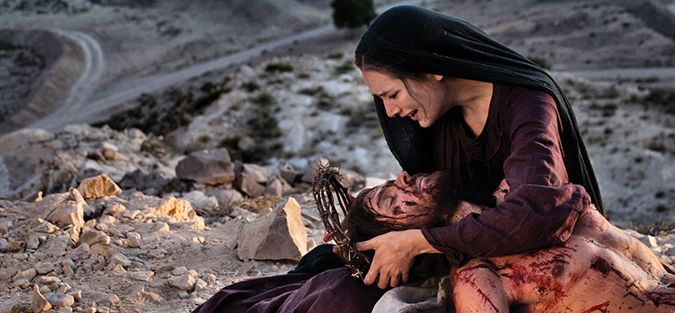Every actress spends her career looking for the perfect role. German actress Alissa Jung landed the part of literally the perfect woman — Mary, the Mother of Jesus — when she was hired to star in the Italian TV miniseries “Mary of Nazareth.” Thrust into an epic production that followed the life of Mary from her childhood through the resurrection of Jesus, Jung found herself shooting on authentic locations across Europe. The result was strong enough to draw praise from no less than Pope Benedict XVI himself after a private showing of the film in the Apostolic Palace.
After receiving huge ratings and much acclaim in its initial TV run, “Mary of Nazareth” has been released in the US as a DVD and Blu-Ray just in time for the Christmas season. As she traveled the U.S. promoting its release, Jung took some time to discuss the experience of playing the Mother of God with The Tidings.
“My agency called me to audition, and I had just three hours before I had to leave for Haiti, where my non-profit organization, Pen Paper Peace, is financing two schools,” recalls Jung. “After a few discussions about doing the audition, we decided to try it right in the moment, in front of my computer, and to mail my video to Rome. It was crazy because I had no time. I had to do six scenes out of the screenplay, I was learning off my computer and doing it right away, with no time to think about it.”
Despite the pressure of her time crunch, Jung landed the part. Soon she was immersed in the movie, which underscores Mary’s special role in God’s plan for mankind’s redemption, her unique relationship with Christ, and the suffering she endured in union with his passion and death, and culminates in the joy she felt at his resurrection.
While Jung initially felt pressure to accurately portray the most famous and revered woman in history, she deflected it by focusing on Mary as “the human being who was a young girl and a mother.”
What Jung ultimately connected to was Mary’s bravery. “She was really brave and that was what I was interested in, then later as a mother, the conflict of knowing she loves her son but has to let him go into suffering and death,” says Jung. “Imagine what it means for a mother to understand and believe everything, but lose your son. I really decided to concentrate on this conflict and the relationship with Joseph and Jesus.”
To prepare for the role, Jung not only read the screenplay and Scriptures about Mary, but also turned to the book, “The Visions of Katharina Emmerick.” Emmerick was a woman in the mid-1800s who had visions of Mary when she was a young girl — visions that many Catholics welcomed into their beliefs on Mary, because they felt it fleshed out her usual limited image as the Mother of Jesus.
A wife and mother of two young children herself, Jung started acting as a child. She feels that her own mothering experiences gave her valuable insights for the role of Mary, and that the role affected her spiritually in a big way.
“Of course it affected me spiritually,” says Jung. “I had beautiful discussions with Catholics, Muslims, and even atheists on the set in Morocco. It was really good to talk and to share thoughts.”
Interested in more? Subscribe to Angelus News to get daily articles sent to your inbox.

